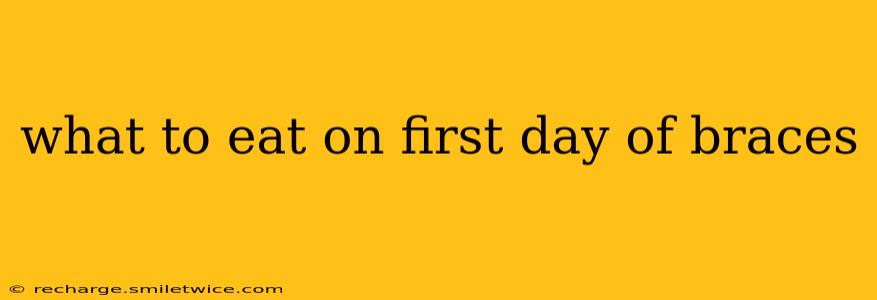What to Eat on the First Day of Braces: A Guide to Soft Foods and Comfort
Getting braces is a big step towards a straighter, healthier smile. But the first few days can be a little…tender. Knowing what to eat on the first day of braces is crucial for comfort and to avoid any unnecessary pain or discomfort. This guide will help navigate those initial days, answering common questions and providing a delicious menu of brace-friendly options.
What should I eat after getting braces?
The first 24 hours after getting braces are the most crucial. Your mouth will likely be sore, and your cheeks may be irritated from the brackets. Focus on soft foods that require minimal chewing. Think creamy soups, yogurt, mashed potatoes, and applesauce. Avoid anything crunchy, chewy, sticky, or hard. This isn't a permanent diet, but it’s essential for initial healing and comfort.
What are some good foods to eat with new braces?
Here's a list of foods perfect for that first day and the days following:
-
Soups: Creamy tomato soup, lentil soup, chicken noodle soup (ensure noodles are very soft), and broth-based soups are all excellent choices. Avoid soups with chunky vegetables or hard noodles.
-
Yogurt: Plain or flavored yogurt provides essential nutrients and is incredibly gentle on your mouth.
-
Smoothies: Blend fruits, vegetables, and yogurt for a nutritious and easy-to-consume meal replacement.
-
Mashed Potatoes: A classic comfort food that requires minimal chewing.
-
Applesauce: A sweet and healthy option that's easily digestible.
-
Scrambled Eggs: Softly scrambled eggs are a great source of protein.
-
Oatmeal: Cooked oatmeal is soft and soothing.
-
Pasta (well-cooked): Choose very well-cooked pasta and softer sauces to avoid any irritation.
-
Pureed Foods: Baby food might sound silly, but pureed sweet potatoes, carrots, or peas can provide essential nutrients without causing discomfort.
Can I eat ice cream with braces?
While ice cream might seem appealing, it's best to avoid it, especially in the first few days. The cold can exacerbate any soreness, and the sugar content can contribute to plaque buildup around your braces. If you crave something cold and sweet, opt for a smoothie or a soft frozen yogurt instead.
What foods should I avoid with new braces?
This is the most important section! These foods are potential brace-breakers and pain-inducers:
-
Hard candies: These can easily break your brackets.
-
Popcorn: Those kernels are tiny landmines for your braces.
-
Nuts: They're tough and can damage your appliance.
-
Sticky candies: Caramel, taffy, and gummies can get stuck and are difficult to remove.
-
Chewy foods: Tough meats, bagels, and bread are best avoided until your mouth adjusts.
-
Hard fruits and vegetables: Apples, carrots, and corn on the cob are a definite no-go initially. Cut these into very small, soft pieces once your mouth heals.
-
Ice: Avoid chewing ice, as it can chip or damage your braces.
How long do I need to eat soft foods after getting braces?
The duration you'll need to stick to a soft food diet depends entirely on your individual experience and pain tolerance. Most people find they can gradually reintroduce more solid foods within a week or two. However, listen to your body; if something hurts, don't eat it.
What if I accidentally eat something I shouldn't have?
Don't panic! If you accidentally eat something too hard or sticky, rinse your mouth thoroughly and check your braces for any damage. If you notice anything broken or loose, contact your orthodontist immediately.
Remember, the first day with braces is all about comfort and healing. By following these guidelines and prioritizing soft foods, you can navigate this initial phase smoothly and look forward to a beautiful, healthy smile. Remember to consult your orthodontist or dentist for personalized dietary advice.
